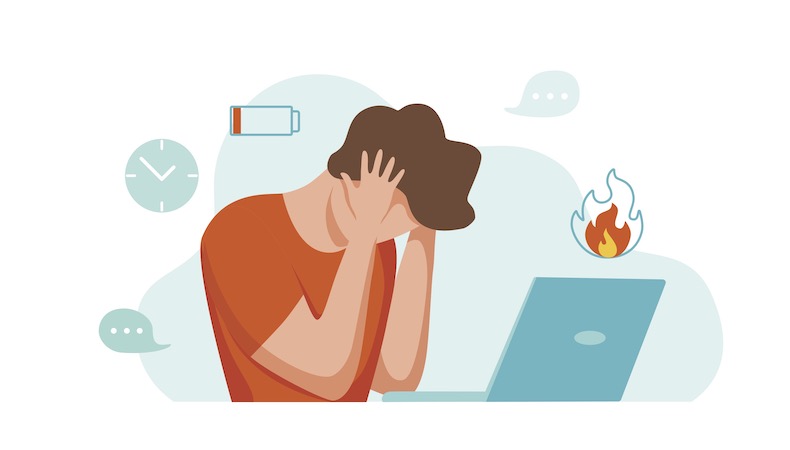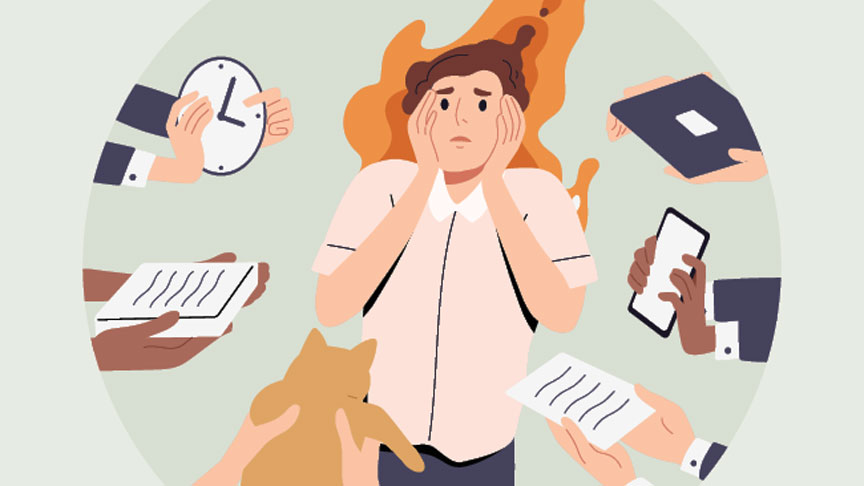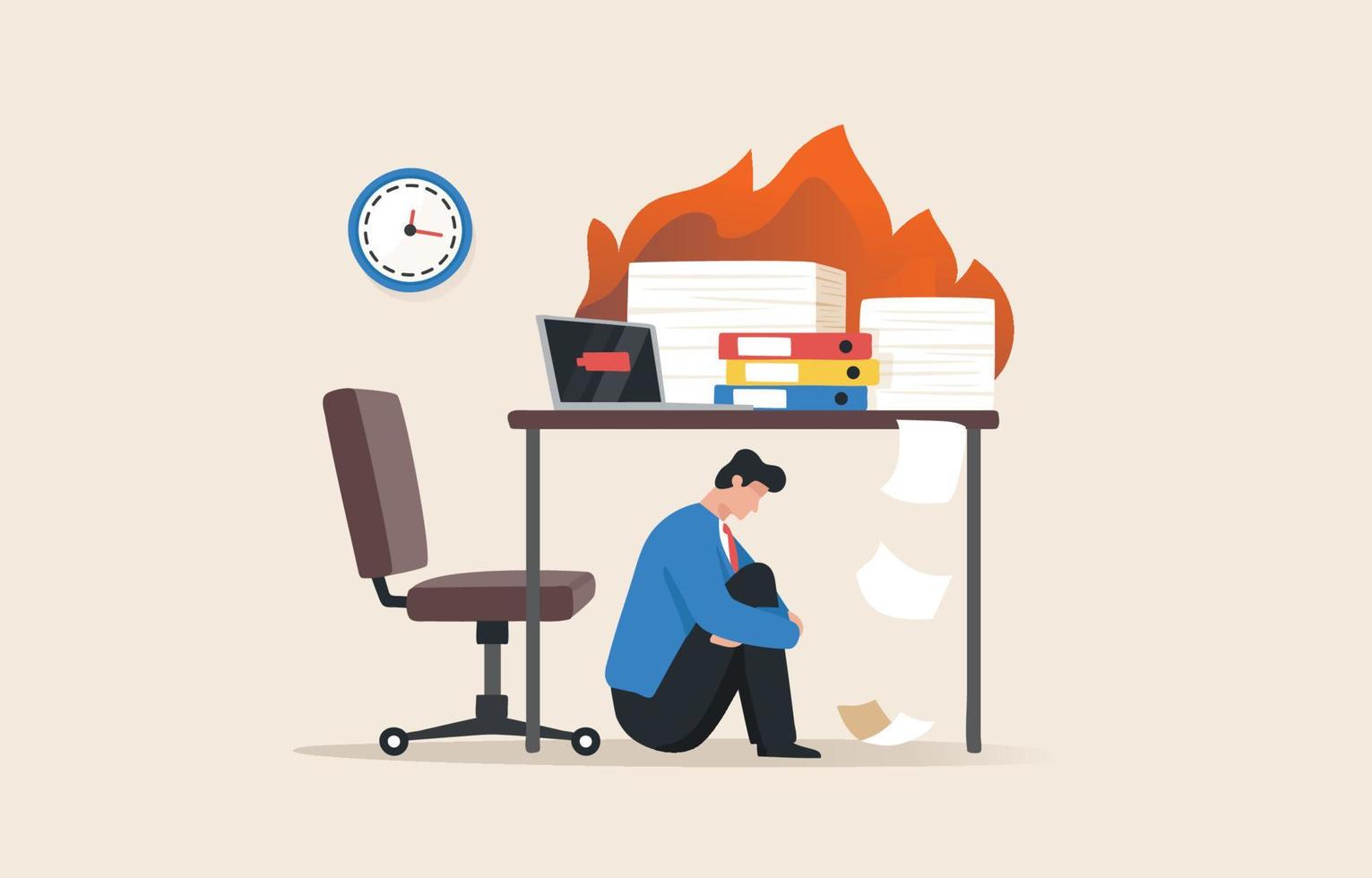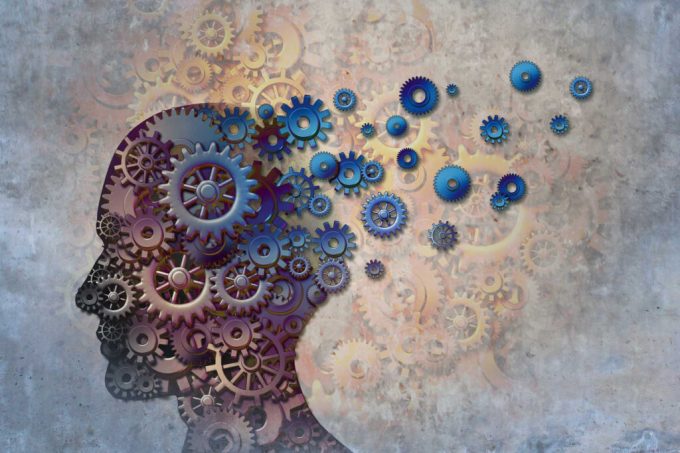Your mental wellbeing is the unique way that you handle your emotions, respond to stress, and is determined by your general outlook on life. Research supports the idea that having a healthy sense of mental wellbeing has many benefits. It allows us to experience enjoyment in life, promotes resilience in difficult situations, set and fulfil goals, as well as build and maintain relationships.
Stress, however, is a normal part of life. No matter how much we may wish for a stress-free life, stress is a natural human response that is necessary and ever present. In small amounts, stress (such as having a deadline) can improve mental wellbeing, by boosting productivity, alertness, and energy levels. However, when our experience of stress becomes prolonged or greater than our ability to cope with, it can be physically and mentally draining. Chronic stress can have overwhelming consequences on your mind and body.

What is burnout?
Burnout is a state of emotional, physical, and mental exhaustion caused by excessive and prolonged stress. It occurs when you feel overwhelmed, emotionally drained, and unable to meet constant demands. As the stress continues, you begin to lose the interest and motivation that led you to take on a certain role in the first place.
Burnout reduces productivity and saps your energy, leaving you feeling increasingly helpless, hopeless, cynical, and resentful. Eventually, you may feel like you have nothing more to give.
The negative effects of burnout spill over into every area of life—including your home, work, and social life. Burnout can also cause long-term changes to your body that make you vulnerable to illnesses like colds and flu. Because of its many consequences, it’s important to deal with burnout right away.
Burnout can be caused by stress, but it’s not the same. Stress results from too much mental and physical pressure and too many demands on your time and energy. Burnout is about too little. Too little emotion, motivation, or care. Stress can make you feel overwhelmed, but burnout makes you feel depleted and used up.
The condition isn’t medically diagnosed. But burnout can affect your physical and mental health if you don’t acknowledge or treat it.

Burnout vs depression
Burnout can look like depression. So, it’s critical to get a professional diagnosis. A key difference is that you can ease burnout with rest or time off. However, depression, a medical illness, needs to be treated with therapy or medication. Burnout is usually related to one aspect of your life — your job, caregiving, or some other type of prolonged and stressful activity. Depression, on the other hand, affects every aspect of your life. Not treating burnout may raise your risk for depression.
Causes of Burnout
Burnout is not simply a result of working long hours or juggling too many tasks, though those both play a role. The cynicism, depression, and lethargy that are characteristic of burnout most often occur when a person is not in control of how a job is carried out, at work or at home, or is asked to complete tasks that conflict with their sense of self.
Equally pressing is working toward a goal that doesn’t resonate, or when a person lacks support. If a person doesn’t tailor responsibilities to match a true calling, or at least take a break once in a while, they could face burnout—as well as the mountain of mental and physical health problems that often come along with it, including headaches, fatigue, heartburn, and other gastrointestinal symptoms, as well as increased potential for alcohol, drug, or food misuse.
Other factors that can contribute to burnout include:
- Poor communication from your employer
- Lack of clarity about your role or duties
- Intense pressure and tight deadlines
- Feeling like you have no control over your life or work
- Being mistreated by your boss or coworkers
- Excessive workloads or expectations
- Working too long without enough time to rest
- Work that is overly boring or stressful
- Not getting enough sleep
- Lack of social support
- Lack of recognition for your efforts
- Poor work-life balance

Signs of burnout
Burnout is complex and can show up in various ways, affecting us physically, emotionally, and behaviorally. Understanding the signs of burnout can help identify and address the condition early.
Physical signs
- Exhaustion and fatigue: Overwhelming tiredness, even after rest
- Gastrointestinal disorders: Stomach aches, diarrhea, constipation, or other digestive issues
- Headaches: Frequent tension headaches or migraines
- Increased illness: Lowered immunity leading to frequent infections, like colds or flu
- Insomnia: Difficulty falling asleep or staying asleep, leading to chronic sleep deprivation
- Loss of appetite: Significant decrease in appetite and eating habits.
- Muscle pain: Unexplained muscle aches and pains
Emotional signs
- Anger or irritability: Feeling short-tempered or quick to frustration with co-workers, friends, or family, often over small issues
- Anxiety: Persistent feelings of tension or worry about work and daily life
- Cynicism: Negative, skeptical attitudes toward work and people around you
- Depersonalization: Disconnection from yourself and your surroundings
- Depression: Persistent sadness, hopelessness, or feelings of worthlessness
- Listlessness: Lack of energy or interest in daily activities
- Apathy and hopelessness: A sense that nothing matters and conditions won’t improve
- Loss of enjoyment: Activities and hobbies that once brought joy now feel uninteresting
- Lack of control: A feeling of having no influence over your work or your life
Behavioral signs
- Concentration issues: Difficulty focusing on tasks at work or in personal life
- Decreased productivity: Noticeable decline in work output and quality
- Hatred of your job: Strong aversion to your work and workplace
- Increased isolation: Withdrawal from social contacts and activities
- A lack of motivation: Struggling to start tasks or find the energy to complete them
- Reduced efficacy: The feeling that your efforts do not matter or make a difference

Types of Burnout
These are four types of burnout:
Overload burnout: This happens when you work harder and harder, becoming frantic in your pursuit of success. If you experience this, you may be willing to risk your health and personal life to feel successful.
Under-challenged burnout: This happens when you feel underappreciated and bored. Maybe your job doesn’t provide learning opportunities or have room for professional growth. If you feel under-challenged, you may distance yourself, become cynical, and avoid responsibilities.
Neglect burnout: This happens when you feel helpless. If things aren’t going right, you may believe you’re incompetent or unable to keep up with your responsibilities. Such burnout can be closely connected to imposter syndrome, a psychological pattern in which you doubt your abilities, talents, or accomplishments.
Habitual burnout: The most serious phase of burnout, habitual burnout happens when your physical and mental fatigue is chronic. You feel sad and your behavior changes. Sometimes, you can cross over into depression and suicidal thoughts. It’s crucial to seek help at this stage.

The 6 steps of burnout recovery
According to a commonly cited article in Work and Stress, there are six consecutive steps a person needs to take when recovering from burnout:
1. Admitting you’re burned out. You can’t get better if you don’t acknowledge that your current situation needs to change. This can be difficult, especially if the thing that’s burning you out — parenting or a job you love, for example — is important to you.
2. Putting distance between yourself and your stressors, if possible. What that means will vary based on your situation and resources. “Distance” could be as significant as quitting your job or taking a leave of absence from work. Or it could be as small as — or even smaller than — taking a mental health day. Or taking some child-free time for self-care.
3. Focusing on your health. You’ve been running on empty for a while, so it’s time to refill your tank. That may mean getting an extra hour of sleep at night, cooking your favorite food instead of grabbing takeout or going out dancing with your friends. Whatever helps you feel like yourself again.
4. Re-evaluating your goals and values. As your health starts to improve, it’s time to use those resources to do some thinking about the situation that led you to burnout. What are you not getting that you need to be happy? Is your mindset helping or hurting you? Are your priorities in sync with your values? What’s most important to you and why?
5. Explore alternative paths and opportunities. Once you have a sense of what needs are being unmet in your life, it’s time to do something about it. What concrete change(s) could you make to improve your situation? Maybe you need to leave a relationship that’s no longer serving you … or maybe you just need to get a night to yourself once a week. The changes don’t necessarily have to be big to make a meaningful difference in your daily life.
6. Take a break and/or make a change. Once you’ve figured out what you need, you have to actually do it. That’s not always easy, but it is vital to the recovery process.

Regaining balance in your life
Now is the time to pause and change direction by learning how you can help yourself overcome burnout. If you recognize some of these warning signs starting to creep into your life or may already be present, finding ways to regain a sense of well-being again may include:
- Turn to other people for support: friends, colleagues, or community groups
- Reframe the way you look at work or your home life by finding value, meaning and balance
- Reevaluate your priorities by taking time off or regular breaks during the day
- Nourishing your creativity by doing something interesting
- Make physical activity a priority to boost your mood and energy
- Support your body with a healthy diet and quality sleep.
Taking a few moments each day to nurture your mental wellbeing will help you be a happier and more resilient you. You deserve the best possible you!














Leave a comment